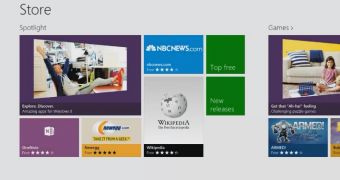With over 40,000 apps already available for download for the owners of Windows 8 and Windows RT computers, Microsoft’s Windows Store is picking up steam, and the company is making sure that this continues.
The company has just announced a new feature available for app builders with software submitted for approval in the Windows Store, namely crash reports.
Based on the fact that many applications fail the certification process due to becoming unresponsive during the testing period, the Redmond-based software giant has decided to provide developers with more info on the matter.
The company expects this addition to the app certification stage to prove beneficial for both users and developers, and for Microsoft itself, since everybody is interested in having more apps available in the Windows Store as soon as possible.
“Due to any number of reasons an app might crash, it can be hard to know what happened and how to fix it, especially if you don’t experience the crash locally,” the company notes in a blog post.
Starting with Monday, a crash file will be sent to the developer when an application fails certification due to such issues, offering specific info on what happened during the test, and what can be done to resolve the issue.
The crash file will be provided to app builders in any of the following two formats:
- A crash dump (.dmp) file contains critical info about the crashed application. These can be opened in Visual Studio 2012 or with our Windows Debugger Tools.
- An ErrorInfo (.txt) file contains info about crashes related to an unhandled JavaScript exception.
As soon as the problem that affected the app is resolved, developers can resubmit the software for testing and approval.
The Dev Center was updated to reflect these changes as well, and those who would like to learn more on the matter should head there for specifics. As always, crash data for published apps is accessible through the Quality reports in the Windows Store Dashboard.

 14 DAY TRIAL //
14 DAY TRIAL //